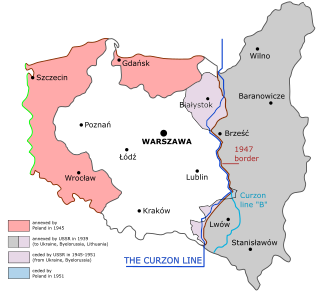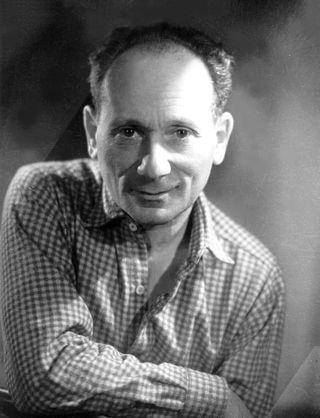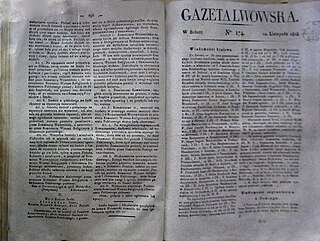
Lviv is the largest city in western Ukraine, as well as the sixth-largest city in Ukraine, with a population of 717,500. It serves as the administrative centre of Lviv Oblast and Lviv Raion, and is one of the main cultural centres of Ukraine. Lviv also hosts the administration of Lviv urban hromada. It was named after Leo I of Galicia, the eldest son of Daniel, King of Ruthenia.

Seventeen days after the German invasion of Poland in 1939, which marked the beginning of the Second World War, the Soviet Union entered the eastern regions of Poland and annexed territories totalling 201,015 square kilometres (77,612 sq mi) with a population of 13,299,000. Inhabitants besides ethnic Poles included Belarusian and Ukrainian major population groups, and also Czechs, Lithuanians, Jews, and other minority groups.
The Polish minority in the Soviet Union are Polish diaspora who used to reside near or within the borders of the Soviet Union before its dissolution. Some of them continued to live in the post-Soviet states, most notably in Lithuania, Belarus, and Ukraine, the areas historically associated with the Polish–Lithuanian Commonwealth, as well as in Kazakhstan and Azerbaijan among others.

Józef Mackiewicz was a Polish writer, novelist and political commentator; best known for his documentary novels Nie trzeba głośno mówić, and Droga donikąd. He staunchly opposed communism, referring to himself as an "anticommunist by nationality". Mackiewicz died in exile. His older brother Stanisław Mackiewicz was also a writer.

Lychakiv Cemetery, officially State History and Culture Museum-Preserve "Lychakiv Cemetery", is a historic cemetery in Lviv, Ukraine.

Eastern Borderlands or simply Borderlands was a term coined for the eastern part of the Second Polish Republic during the interwar period (1918–1939). Largely agricultural and extensively multi-ethnic with a Polish minority, it amounted to nearly half of the territory of interwar Poland. Historically situated in the eastern Polish–Lithuanian Commonwealth, following the 18th-century foreign partitions it was divided between the Empires of Russia and Austria-Hungary, and ceded to Poland in 1921 after the Treaty of Riga. As a result of the post-World War II border changes, all of the territory was ceded to the USSR, and none of it is in modern Poland.

Polonophobia, also referred to as anti-Polonism or anti-Polish sentiment are terms for negative attitudes, prejudices, and actions against Poles as an ethnic group, Poland as their country, and their culture. These include ethnic prejudice against Poles and persons of Polish descent, other forms of discrimination, and mistreatment of Poles and the Polish diaspora.

Kurier Wileński is the main Polish-language newspaper in Lithuania. Printed in Vilnius, it is the only Polish-language daily newspaper published east of Poland. A direct descendant of both the 19th-century newspaper of the same name and the Czerwony Sztandar newspaper, created by the Soviet authorities in 1953 as a means of Sovietization of the Polish diaspora left in the Polish areas annexed by the Soviet Union. The newspaper is a member of the European Association of Daily Newspapers in Minority and Regional Languages (MIDAS). According to TNS Gallup media research, Kurier Wileński 36,800 people or 1.4% of Lithuania's population read at least one issue out of the last six in summer 2008, but that measure dropped to 0.3% in spring 2010.

Julian Stryjkowski was a Polish journalist and writer, known for his social prose and radical leftist leanings. He was considered one of the best Polish-Jewish writers of the communist era.

The Soviet invasion of Poland was a military conflict by the Soviet Union without a formal declaration of war. On 17 September 1939, the Soviet Union invaded Poland from the east, 16 days after Nazi Germany invaded Poland from the west. Subsequent military operations lasted for the following 20 days and ended on 6 October 1939 with the two-way division and annexation of the entire territory of the Second Polish Republic by Nazi Germany and the Soviet Union. This division is sometimes called the Fourth Partition of Poland. The Soviet invasion of Poland was indirectly indicated in the "secret protocol" of the Molotov–Ribbentrop Pact signed on 23 August 1939, which divided Poland into "spheres of influence" of the two powers. German and Soviet cooperation in the invasion of Poland has been described as co-belligerence.
Polish culture during World War II was suppressed by the occupying powers of Nazi Germany and the Soviet Union, both of whom were hostile to Poland's people and cultural heritage. Policies aimed at cultural genocide resulted in the deaths of thousands of scholars and artists, and the theft and destruction of innumerable cultural artifacts. ''The maltreatment of the Poles was one of many ways in which the Nazi and Soviet regimes had grown to resemble one another", wrote British historian Niall Ferguson.

The Polish population transfers in 1944–1946 from the eastern half of prewar Poland, were the forced migrations of Poles toward the end and in the aftermath of World War II. These were the result of a Soviet Union policy that had been ratified by the main Allies of World War II. Similarly, the Soviet Union had enforced policies between 1939 and 1941 which targeted and expelled ethnic Poles residing in the Soviet zone of occupation following the Nazi-Soviet invasion of Poland. The second wave of expulsions resulted from the retaking of Poland from the Wehrmacht by the Red Army. The USSR took over territory for its western republics.

Władysław Siemaszko is a Polish publicist and lawyer, former member of the Polish resistance Armia Krajowa (AK), author of numerous publications focusing on the massacres of Poles in Volhynia. He is the father of writer Ewa Siemaszko, co-author of Ludobójstwo dokonane przez nacjonalistów ukraińskich na ludności polskiej Wołynia 1939–45 consisting of two volumes of 1,500 pages of research.

Gazeta Lwowska is a Polish language biweekly magazine, published since 24 December 1990 in Lviv Ukraine. The publication refers to the traditions of a Polish language paper Gazeta Lwowska, which was published between 1811 and 1944 and as such was one of the oldest Polish newspapers.

On the basis of a secret clause of the Molotov–Ribbentrop Pact, the Soviet Union invaded Poland on September 17, 1939, capturing the eastern provinces of the Second Polish Republic. Lwów, the capital of the Lwów Voivodeship and the principal city and cultural center of the region of Galicia, was captured and occupied by September 22, 1939 along with other provincial capitals including Tarnopol, Brześć, Stanisławów, Łuck, and Wilno to the north. The eastern provinces of interwar Poland were inhabited by an ethnically mixed population, with ethnic Poles as well as Polish Jews dominant in the cities, and ethnic Ukrainians dominating the countryside and overall. These lands now form the backbone of modern Western Ukraine and West Belarus.

The Ukrainian National Democratic Alliance (UNDO) was the largest Ukrainian political party in the Second Polish Republic, active in Western Ukraine. It dominated the mainstream political life of the Ukrainian minority in Poland, which with almost 14% of Poland's population was the largest minority.

Jerzy Borejsza was a Polish communist activist and writer. During the Stalinist period of communist Poland, he was chief of a state press and publishing syndicate.

Elections to the People's Assemblies of Western Ukraine and Western Belorussia, which took place on October 22, 1939, were an attempt to legitimize the annexation of the Second Polish Republic's eastern territories by the Soviet Union following the September 17 Soviet invasion of Poland in accordance with the secret protocol of the Molotov–Ribbentrop Pact. Only one month after these lands were occupied by the Red Army, the Soviet secret police and military led by the Party officials staged the local elections in an atmosphere of state terror. The referendum was rigged. The ballot envelopes were numbered and often handed over already sealed. By design, the candidates were unknown to their constituencies which were brought to the voting stations by armed militias. The results were to become the official legitimization of the Soviet takeover of what is known today as the Western Belorussia and the Western Ukraine. Consequently, both Assemblies voted for incorporation of all formerly Polish voivodeships into the Soviet Union.

The occupation of Poland by Nazi Germany and the Soviet Union during World War II (1939–1945) began with the Invasion of Poland in September 1939, and it was formally concluded with the defeat of Germany by the Allies in May 1945. Throughout the entire course of the occupation, the territory of Poland was divided between Nazi Germany and the Soviet Union (USSR), both of which intended to eradicate Poland's culture and subjugate its people. In the summer-autumn of 1941, the lands which were annexed by the Soviets were overrun by Germany in the course of the initially successful German attack on the USSR. After a few years of fighting, the Red Army drove the German forces out of the USSR and crossed into Poland from the rest of Central and Eastern Europe.

















